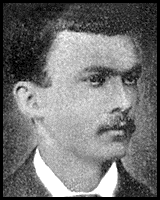This article includes a list of references, related reading, or external links, but its sources remain unclear because it lacks inline citations. (January 2013) |
Adelino Fontoura Chaves (March 30, 1859 – May 2, 1884) was a Brazilian poet, actor and journalist. He is the patron of the 1st chair of the Brazilian Academy of Letters.
Adelino Fontoura | |
|---|---|
 A photograph of Fontoura | |
| Born | Adelino Fontoura Chaves March 30, 1859 Axixá, Brazil |
| Died | May 2, 1884 (aged 25) Lisbon, Portugal |
| Occupation | Poet, actor, journalist |
| Nationality | |
| Literary movement | Parnassianism |
Life
editAdelino Fontoura was born in the city of Axixá, in Maranhão, to Antônio Fontoura Chaves and Francisca Dias Fontoura.
Since as a child, he would have a very strong friendship with future author Artur Azevedo.
Moving to Recife, he would work at the satirical journal Os Xênios. Returning to Maranhão, he initiated his artistical career, performing in a play that would make him arrested. After this incident, he moved to Rio de Janeiro.
He tried the artistic and the journalistic career, failing in the first one. He wrote for journals Folha Nova, O Combate and A Gazetinha, where he published some poems and works in prose — and, in this last one, he would collaborate once more with Azevedo, who was its founder. Alongside Ferreira de Menezes, Augusto Ribeiro, Hugo Leal and João de Almeida, he would work for the journal A Gazeta da Tarde, that was, according to Múcio Leão, "one of the most ill-fated journals ever founded", because its founders would die in the next three years after the journal's existence.
After the Gazeta da Tarde was bought by José do Patrocínio, Adelino becomes its correspondent in Paris. Already very sick, his situation got worse due to the harsh French winter, what made him move to Lisbon in an unsuccessful attempt to get better.
He died with only 25 years, without publishing any book.
Work
editAs mentioned above, Fontoura's work is very sparse, as he did not published anything during his lifetime. Attempts of compiling his poetry were made during the 1940s and 1950s by Múcio Leão.
His most well-known poem is the sonnet "Celeste".
| Portuguese language | English |
|---|---|
|
É tão divina a angélica aparência Peregrina do céu, pálida estrela, Tem a celeste e ingênua formosura E quando os olhos para o céu levanta, |
It is so divine her angelic appearance Pilgrim of the skies, O pale star, She has the celestial and naïve beauty And when she raises her eyes to the sky, |